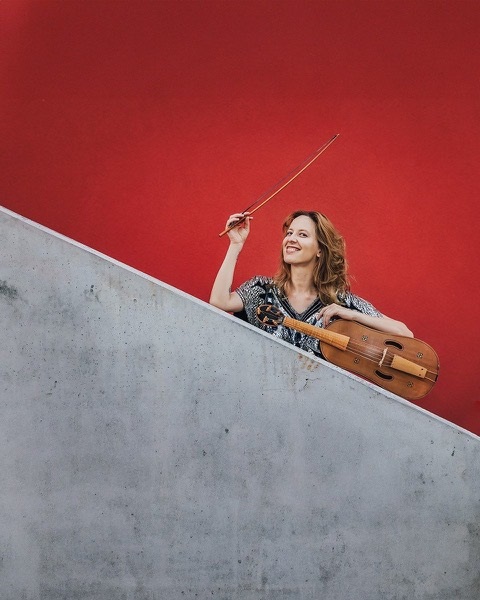
Sollazzo artistic director and vielle player Anna Danilevskaia
IT is almost ten years since I heard this stand-out ensemble – as winners of the prestigious York Early Music International Young Artists Competition in 2015 and then again in 2016 – and I was really looking forward to hearing them again.
Under the stewardship of artistic director and vielle player Anna Danilevskaia, Sollazzo has continued to explore and share a rich vein of Medieval and early Renaissance music. This evening, it was the music of the 14th-century composer Francesco Landini.
The concert opened with an instantly engaging Kyrie Rondello (Anonymous) featuring the whole ensemble, an ensemble that clearly enjoyed each other’s company. Crisp instrumental exchanges – Natalie Carducci and Anna Danilevskaia’s vielle, Christoph Sommer’s lute and Roger Helou’s organetto – were complemented by an evolving harmonic cloud of individual melodies created by singers Carine Tinney (soprano) and the two tenors, Jonatan Alvarado and Lior Leibovici. Quite wonderful.
This was followed by Landini’s instrumental ballata, Somma Felicita, Ms Danilevskaia and Roger Helou clearly relishing their melodic exchanges.
I thought I heard the ‘Landini cadence’ calling card, but the performance of O Piñata Vagha completely knocked me off kilter. Goodness me, this was sublime. The seamless interplay between soprano Carine Tinney, Mr Helou and Anna Danilevskaia had a medieval ring of authenticity.
The modal nature of the melodic lines and the beautifully integrated ornamentation by Ms Tinney gave the performance a transcendental magic. OK, I admit it, I was hooked. And from that moment on, I simply couldn’t take my ears off Carine Tinney.
That said, it was the clean, vibrato-free singing of tenor Jonatan Alvarado that drew the ear in Landini’s Questa Fanciulla. The agile precision of his singing blended seamlessly with soprano Ms Tinney, creating crystal-clear melodic lines within the polyphonic texture. This was reinforced by the delicate interplay of the accompanying vielle, lute and organetto.
The second section of the concert programmed four instrumental works by Landini. All magnetically engaging and a real joy. The standout, however, was the luminous quality and artistry of Roger Helou’s organetto playing. Even his retuning of the organetto – with vocalise support – proved to be a rewarding listen. Not that Mr Helou’s performance was superior, obviously, but that the impression was so haunting and familiar. To my ears, it sounded (almost) exactly like a recorder.
The closing work in this grouping was a beautiful interpretation of Niccolò da Perugia’s 14th-century ballata, Il Megli è Pur Tacere. Here, heavenly matters were put aside in favour of earthly matters of unrequited love. Although the words express the emotional burden of keeping silent in the face of pain, love, or truth, the performance itself brimmed with a rustic vitality.
The closing grouping opened with Giovanni da Firenze’s Quand Amor, a madrigal expressing fragility and introspection. The performance embraced the melancholic, contemplative mood, and the performance by Carine Tinney – glissandos bleeding into adjacent notes, achingly beautiful ornamentation – once again stood out.
The concert concluded with a touching and always engaging performance of Francesco Landini’s hymn to virtue, Perche Virtù: “Since virtue does make humans steady and strong/Run towards virtue, if you want to escape death”. Well, who could disagree with that?
Sollazzo’s use of period-appropriate tuning and musically transparent textures absolutely enhances historical authenticity, but it’s the seamless blending of voices with period instruments that truly sets them apart.
Finally, I knew Francesco Landini was celebrated as a singer and poet; that he was a virtuoso organetto (portable organ) player and that he was blind from early childhood (smallpox) – earning him the nickname “Magister Franciscus Caecus” (Master Francesco the Blind). I just didn’t know how truly remarkable a composer he was.
Review by Steve Crowther
